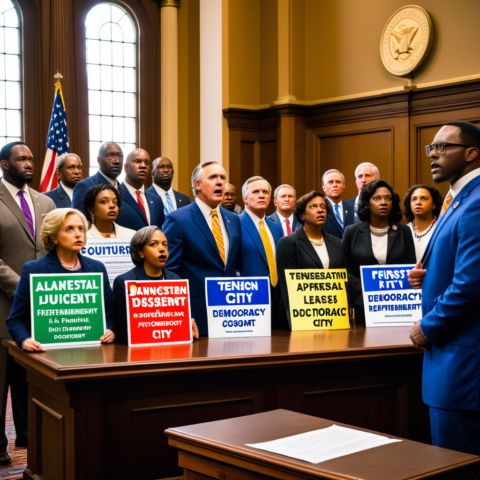In a stunning move that undermines both constitutional rights and democratic principles, Tennessee has passed a law making it a felony for elected officials to vote in favor of sanctuary city policies. This unprecedented legislation criminalizes a fundamental aspect of democracy—the right of elected representatives to vote according to their conscience and the will of their constituents.
This law is not only unconstitutional but also a dangerous step toward authoritarian governance. By penalizing lawmakers for their political positions, Tennessee is setting a chilling precedent that could extend beyond immigration policy and into other areas of governance.
The Law: Criminalizing Political Dissent
The legislation, which took effect in January 2025, classifies support for sanctuary city policies as a Class E felony, carrying a fine of $3,000 and the automatic removal of the official from office upon conviction.
The law specifically targets mayors, city council members, and county officials who vote in favor of policies that limit cooperation with federal immigration enforcement. Under its provisions, an official could be prosecuted simply for casting a vote that aligns with their district’s values but conflicts with state and federal immigration priorities.
Proponents of the law, largely Republican lawmakers and allies of former President Donald Trump, argue that it is necessary to enforce immigration laws and prevent Tennessee cities from becoming “sanctuaries” for undocumented immigrants. However, this justification ignores the larger and more dangerous implications of criminalizing political decisions.
A Clear Violation of the First Amendment
At its core, this law is a blatant violation of the First Amendment, which protects freedom of speech, freedom of political expression, and the right of elected representatives to debate and legislate on behalf of their constituents.
The U.S. Supreme Court has repeatedly affirmed that political speech, including the votes cast by elected officials, is among the most protected forms of speech under the First Amendment. By making certain votes a criminal act, Tennessee is directly infringing upon these rights.
Precedents in Constitutional Law
In Bond v. Floyd (1966), the Supreme Court ruled that a legislature cannot punish a member for expressing their views on government policy.
In Reed v. Town of Gilbert (2015), the Court reaffirmed that laws restricting political speech must serve a compelling government interest and be narrowly tailored—this law does neither.
The Tennessee Constitution itself guarantees freedom of conscience and political expression under Article I, Section 19, making this law a violation of the state’s own legal foundation.
An Affront to Democracy and Representative Government
Beyond its legal implications, this law strikes at the heart of democratic governance. In a representative democracy, lawmakers are elected to reflect the will of their constituents, debate policies, and make decisions based on their best judgment. Criminalizing a vote removes that agency and creates a climate of fear and coercion.
If Tennessee lawmakers can be charged with a felony simply for their policy positions, what’s stopping other states from doing the same? Could legislators be criminalized for voting in favor of abortion rights, gun reform, or climate initiatives? The logic of this law can be extended to any issue, effectively dismantling the principle of free legislative decision-making.
Chilling Effects: Silencing Opposition
Even if few officials are prosecuted under this law, its mere existence will have a chilling effect on political debate. Elected officials who might otherwise support sanctuary city policies—or any controversial policy in the future—will now think twice, fearing prosecution, removal from office, or financial ruin.
This law transforms immigration policy from a matter of governance into a legal weapon, ensuring that only one viewpoint—the state’s viewpoint—is allowed in public discourse. That is not democracy. That is legislative suppression.
Legal Challenges and Resistance
Unsurprisingly, civil rights groups and legal scholars are already mobilizing to challenge this law. The American Civil Liberties Union (ACLU) of Tennessee has announced plans to file a lawsuit, arguing that the law is unconstitutional and a dangerous precedent.
Additionally, constitutional scholars predict that this law will likely be struck down in federal court, as it directly contradicts Supreme Court rulings on the rights of legislators to express their political views.
The Bigger Picture: The Danger of Criminalizing Politics
Tennessee’s move reflects a larger, growing trend of authoritarian policies that punish dissent. Across the country, similar efforts are being made to suppress protest rights, criminalize teachers who discuss certain topics in schools, and restrict voting rights.
If voting the “wrong” way becomes a criminal act, then democracy is no longer a functioning system—it is merely a facade for authoritarian control.
What Can Be Done?
This law will not be defeated through legal action alone—it requires public outcry and resistance. Here’s what concerned citizens can do:
1. Pressure State Lawmakers – Call, email, or protest at the offices of Tennessee legislators demanding the repeal of this law.
2. Support Legal Challenges – Donate to organizations like the ACLU of Tennessee, which are fighting this in court.
3. Raise Awareness – Spread the word about how dangerous this precedent is, not just for Tennessee but for democracy nationwide.
4. Vote in Local Elections – Ensure that state representatives who support this kind of unconstitutional law are removed through the ballot box.
Conclusion: A Test of American Democracy
This law is not just a Tennessee issue—it is a test of American democracy itself. If this law is allowed to stand, it sets a dangerous precedent for criminalizing political disagreement. The right to vote—whether in an election or in a legislative chamber—must never be threatened with prosecution.
Tennessee’s law is an unconstitutional attack on free speech, democratic representation, and the very foundations of governance. It must be challenged, overturned, and remembered as a warning of what happens when political power is used to suppress dissent.
Because if democracy means anything, it means that no elected official should fear prison simply for casting a vote.


